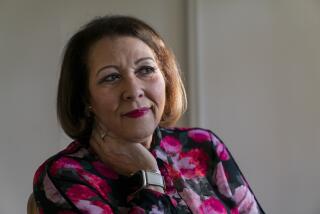Strict Standards for Mammograms Urged : Health: Senate panel is asked to upgrade âad hoc systemâ of regulations for equipment and personnel in breast cancer exams.
WASHINGTON â Mary Stupp did everything a woman is supposed to do to reduce the risk of breast cancer. On her own initiative, Stupp told a Senate hearing Thursday, she had a routine mammogram and was diagnosed as cancer-free.
A year later, after feeling a lump in her breast, she had another mammogram and was again told that she was fine. Still concerned, she asked her doctor to check the results, but he found nothing wrong.
Now, four years later, the 61-year-old Dallas woman is dying from cancer and blames âpoor-quality screening, lackadaisical reading of results . . . and a sense of indifferenceâ by the people who tested her.
Stupp was one of several cancer patients and health care experts who testified before the Senate Labor and Human Resources subcommittee on aging, urging the federal government to enact stringent quality standards for mammogram screening facilities.
Now, the only federal standard requires mammogram facilities to âself-certifyâ if they are to receive Medicare reimbursements, according to the subcommittee. Only nine states have comprehensive mammogram standards and less than a third of the nationâs mammography facilities meet voluntary accreditation standards established by the American College of Radiology.
One of every nine American women will contract breast cancer, according to the American Cancer Society. An estimated 175,000 women will be diagnosed with the disease this year and 45,000 women will die of it.
However, 30% of those lives could be saved by early detection if all women in the nation received regular mammograms, said subcommittee chairman Sen. Brock Adams (D-Wash.).
âBut we canât guarantee that the mammogram a woman gets will be accurate,â Adams said. âWhat we have is an ad hoc system. We have overlapping and conflicting quality standards. We have regulations with a lot of holes.â
There were no estimates Thursday of how often such tests are inaccurate, however.
Janet L. Shikles, director of health financing and policy issues in the General Accounting Officeâs human resources division, said a January, 1990, GAO study also found that strong federal standards on mammography quality are needed.
William L. Roper, director of the Public Health Service at the federal Centers for Disease Control in Atlanta, said that training and education of personnel need to be improved, equipment needs to meet minimum performance standards, facilities need to be evaluated and standard guidelines for mammography techniques need to be developed.
However, Roper said, âeven with mammography of the highest quality currently available, some early cases of breast cancer will be missed. We can improve current practices but we cannot assure 100% accuracy.â
Adams has introduced legislation that would set a federal standard for mammography equipment, personnel and quality control.
Meanwhile, Marilyn Quayle, wife of Vice President Dan Quayle, kicked off a national breast cancer awareness and screening project.
Speaking at Washingtonâs Columbia Hospital for Women Medical Center, Quayle outlined Project Awareness, which will combine nationwide educational efforts with a pilot program to provide free screening and follow-up treatment to 400 low-income women in Sacramento, Washington, Detroit and Charlotte, N.C.
Mammograms âcan help ensure (that) problems are identified early enough for successful treatment, early enough for survival,â said Mrs. Quayle, who is honorary chairwoman of the joint effort between congressional spouses and the Cancer Research Foundation of America. The project will be implemented through the Young Womenâs Christian Assn. and funded by UCLA Womenâs Cancer Research Program and the Revlon company.
âUntil we know how to prevent this disease, early detection is our most vital weapon in combatting breast cancer,â said Mrs. Quayle, estimating that the lives of 12,000 women could be saved.
Televisionâs âThe Cosby Showâ star Phylicia Rashad, who stars in the campaignâs educational video, joined Mrs. Quayle in stressing the importance of education for âthe early detection, treatment and possible cure of breast cancer.â
More to Read
Sign up for Essential California
The most important California stories and recommendations in your inbox every morning.
You may occasionally receive promotional content from the Los Angeles Times.










